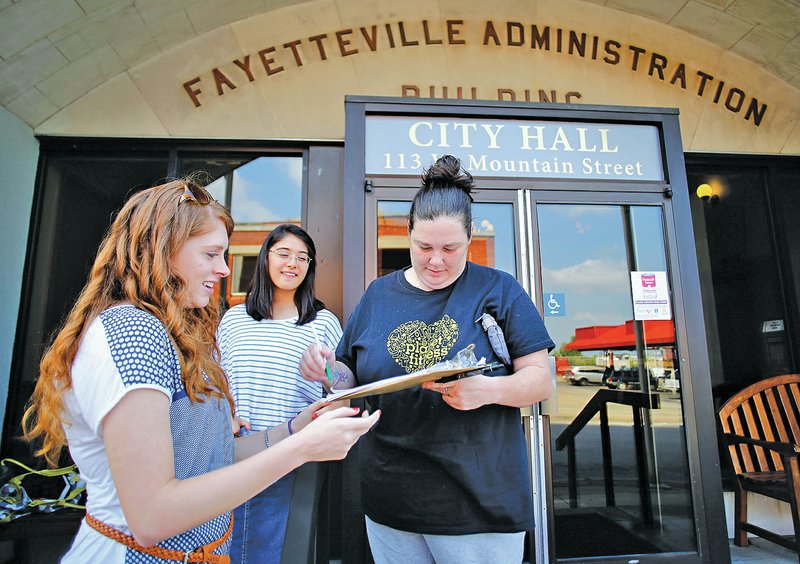FAYETTEVILLE -- Opponents of the city's Civil Rights Administration ordinance submitted enough signatures, with less than four hours to spare, Saturday to the City Clerk's office to put the contentious issue to a public vote.
A preliminary count of the petitions showed 5,722 signatures, well above the 4,095 signatures needed to force a special election within the next four months. The number also was enough to hold the ordinance in abeyance. That means it didn't become law at 5 p.m. Saturday, as previously scheduled.
Web Watch
Civil Rights Administration Ordinance
Go to the online version of this story at nwaonline.com to read a copy of Fayetteville’s recently approved Civil Rights Administration ordinance.
Source: Staff Report
"You can go home and you can realize, 'Yes, I counted, I stood up, I made my voice heard," Wendy Campbell, secretary for the repeal effort, told about two dozen cheering volunteers and other ordinance opponents at City Hall. City Council candidates Paul Phaneuf and Joshua Crawford were among them.
City Clerk Sondra Smith will have 10 days to certify the signatures.
Smith said her staff will be checking addresses and dates of birth to make sure the signatures are from Fayetteville residents who were registered to vote Aug. 20 -- the day the City Council approved the ordinance, 6-2. Petitions also could be ruled invalid if they aren't notarized and signed by the canvasser or if signatures are illegible.
If 4,095 or more signatures are certified, a public referendum will be scheduled. "Repeal 119," a group taking its name from the section of city code that spells out the proposed Civil Rights rules, requested a Dec. 9 special election.
If the certification process causes the number of signatures to fall below the 4,095 threshold, Smith must give canvassers at least 10 additional days to collect signatures.
The ordinance prohibits specific types of discrimination against people because of their sexual orientation, gender identity and a number of other characteristics. It also creates a municipal civil rights administrator position to field, investigate and mediate complaints.
Supporters have said the legislation is needed because state and federal laws don't prevent an employer from firing or refusing to hire someone because he's gay. A landlord can evict or refuse to rent to transgender tenants based on their gender identity with no legal recourse. Restaurants, hotels and other businesses can refuse to serve lesbian couples because of their sexual orientation.
Opponents of the law have said it's unnecessary. Discrimination isn't a problem in Fayetteville, they argued during a marathon City Council meeting Aug. 19-20. They have noted original language for the ordinance came from the Human Rights Campaign, an LGBT advocacy group based in Washington. Other opponents say businesses owners shouldn't be compelled to hire or provide services to gay and lesbian customers against their religious beliefs.
Volunteers with the Repeal 119 campaign have been out collecting signatures at Fayetteville's Revenue Office, Dickson Street post office and on the steps of City Hall.
"This is a big issue. Obviously there's a lot of interest on both sides, and it's something that should be put to a public vote, just because there is so much interest," Travis Story, general counsel for Repeal 119, said Friday. "I think there's a feeling that a lot of people may have spoken, but the (City) Council wasn't listening."
According to a statement of organization filed Sept. 15 with the Arkansas Ethics Commission, Story is one of four officers for Repeal 119. Other officers are Duncan Campbell (president), Wendy Campbell (secretary) and the Rev. Jeremy Flanagan (treasurer).
According to state law, ballot question committees such as Repeal 119 are required to disclose all contributions and expenditures to the Ethics Commission by the 15th day of the month after the first month they spend or receive $500.
Despite having an attorney on board, creating an website and paying for multiple newspaper advertisements, Repeal 119 hasn't yet filed a financial report.
Story said all money the group received came this month. "We'll file all the necessary forms with the Election Commission" by Oct. 15, Story said.
Supporters of the ordinance in some cases were alongside Repeal 119 canvassers, urging residents to "decline to sign."
"The Fayetteville City Council has already done the job we elected them to do and has listened to considerable debate and multiple viewpoints on this," Anne Shelley, spokeswoman for the group, Keep Fayetteville Fair, said Friday.
"This is nothing different than what the (University of Arkansas) or Walmart or other leading employers do already," she added. "To me, the process has already been done and done correctly."
Keep Fayetteville Fair hasn't filed a statement of organization with the Arkansas Ethics Commission. Shelley said paperwork wouldn't be filed until a public referendum is scheduled.
She said the group will focus on "educating the public on the truth around 119."
Supporters and opponents disagree about whether the Civil Rights Administration ordinance would hold up in a public referendum.
Voters in November 1998 rejected a similar "human dignity" resolution, 7,822 to 5,736. The resolution would have added "familial status" and "sexual orientation" to a nondiscrimination policy for city employees.
"I think so much has changed across the country and across Arkansas since 1998," Shelley said. "It's a different time, and the time is now for this type of ordinance."
NW News on 09/21/2014
